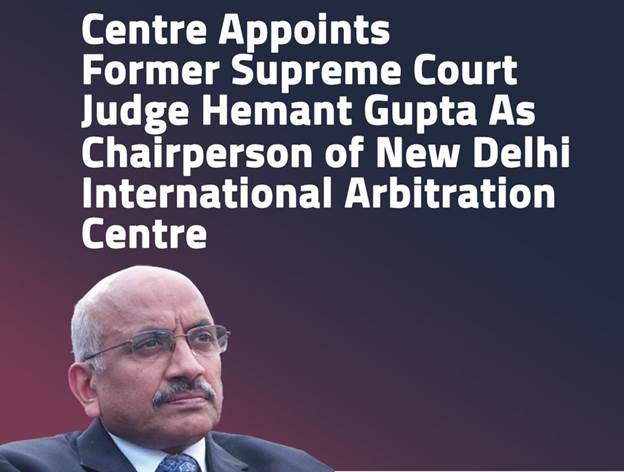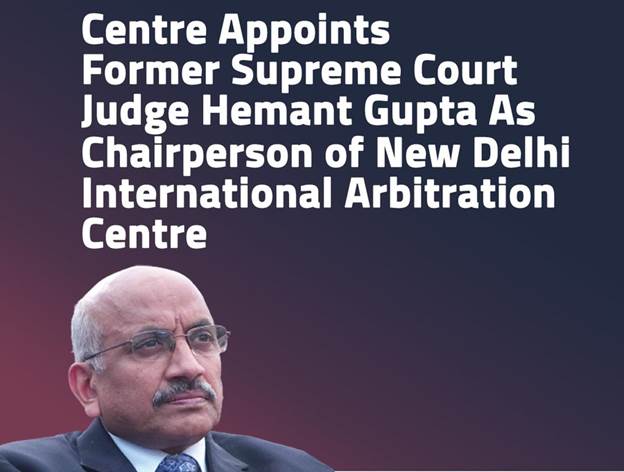Description

Copyright infringement not intended
In News
- The Union Government has appointed Justice Hemant Gupta as the Chairperson of the New Delhi International Arbitration Centre (NDIAC).
- The Appointments Committee of the Cabinet approved his appointment.
- The committee is composed of the Prime Minister of India (ex-officio Chairman) and the Minister of Home Affairs.
.jpg)
New Delhi International Arbitration Centre (NDIAC)
- New Delhi International Arbitration Centre Act 2019 established the NDIAC to conduct arbitration, mediation, and conciliation proceedings.
- It declared the NDIAC as an institution of national importance.
- NDIAC consist of 7 members including:
- A Chairperson who may be a Judge of the Supreme Court or a High Court or an eminent person with special knowledge and experience in the conduct or administration of the arbitration.
- 2 eminent persons having substantial knowledge and experience in institutional arbitration.
- 3 ex-officio members, including a nominee from the Ministry of Finance and a Chief Executive Officer (responsible for the day-to-day administration of the NDIAC).
- A representative from a recognized body of commerce and industry, appointed as a part-time member, on a rotational basis.
- The members will hold office for 3 years and will be eligible for re-appointment.
- The retirement age for the Chairperson is 70 years and for other members is 67 years.
- The key objectives of the NDIAC;
- Promoting studies in the field of alternative dispute resolution.
- Providing training and organizing conferences and seminars in alternative dispute resolution matters.
- Providing facilities and administrative assistance for the conduct of arbitration, mediation and conciliation proceedings.
- Maintaining a panel of accredited professionals to conduct arbitration, mediation and conciliation proceedings.
- To promote arbitration and conciliation in a professional, timely and cost-effective manner.
- The NDIAC required maintaining a fund which will be audited and certified by the Comptroller and Auditor-General of India.
.jpg)
New Delhi International Arbitration Centre (Amendment) Act, 2022
- It amended the New Delhi International Arbitration Centre Act, 2019.
- The amendment act renames the New Delhi International Arbitration Centre as the India International Arbitration Centre.
- The original Act requires the Arbitration Centre to strive to facilitate the conduct of international and domestic arbitration and conciliation.
- The amendment act expands this to include the conduct of other forms of alternative dispute resolution.
- The manner of conduct of arbitration and other forms of alternative dispute resolution will be specified by the central government through regulations.
- The original Act allows the central government to provide for removing any difficulties in implementing the Act up to 2 years from the date of commencement of the Act.
- The amendment act extends this period to 5 years.
Arbitration
- Arbitration is a method of settling disputes without either party having to go to court.
- This involves a neutral third party who receives evidence, hears the arguments and then passes an order known as an award. The award is final.
- Mandatory arbitration is also becoming popular now where contracts state that jurisdiction over disputes would only be settled by an arbitrator and not by a court.
- In India, arbitration is backed by the Arbitration and Conciliation Act of, 1996 which was amended by the Arbitration and Conciliation (Amendment) Act, of 2015.
- The Act provides for a fair chance for both parties to be heard and to settle disputes.
- The award has to be enforced under the Code of Civil Procedure, 1908.
- The Act mandates that arbitration proceedings have to be completed within 12 months, however, if both parties agree, then the period can be extended by 6 months.
- Significance of arbitration
- Cost-effective: Litigating a dispute in court is an expensive process. Arbitration is a much more cost-effective way of settling disputes.
- Speed: There are well-defined time limits to pass awards, resulting in quick disposal of the matter.
- Fairness: Arbitrators are usually appointed by both parties to the agreement resulting in a fair selection of the arbitrator.
- Awards passed are final.
- Simple Procedure: They are not bound by any procedural laws of the land. They are free to take on their procedure to hear arguments, receive evidence and pass awards.
- Confidentiality: Arbitration proceedings are confidential, there is no public record preserved of the dispute. This makes whatever trade secrets or confidential details of the business remain between the parties themselves.
- Specialization: Parties can choose an arbitrator skilled in the law they are facing disputes over, for example, patent law.
https://indianexpress.com/article/india/govt-appoints-former-sc-judge-hemant-gupta-as-chief-of-ndiac-8337656/
https://t.me/+hJqMV1O0se03Njk9













